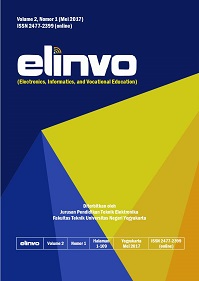PENERAPAN PROBLEM BASED LEARNING UNTUK HIGHER ORDER THINKING SKILLS PADA SISWA PENDIDIKAN TEKNIK INFORMATIKA
DOI:
https://doi.org/10.21831/elinvo.v3i1.19779Keywords:
learning methods, PBL, HOTSAbstract
This research has purpose to know the difference between student learning result with computer network practice course and higher order thinking skill (HOTS) given by demonstration method with problem based learning (PBL) method. This research is a research using quasi experiment consisting of two classes as sample. The one class uses the demonstration learning method, while the other class uses the PBL method. This study has an analysis using t-test. the result of this research is able to show there is difference between student learning outcomes with high thinking ability in computer network practice class among students given demonstration method with students given PBL method. Students who were given demonstration learning methods resulted less than students who had been provided with PBL methods in order to improve learning outcomes.References
[1] Efendi, Agus. E-learninng berbasis schoology dan edmodo: ditinjau dari motivasi dan hasil belajar siswa SMK. Yogyakarta : 2017. Elinvo (Electronics, Informatics and Vocational Education), 2(1), 49-58. ISSN 2477-2399 (online); ISSN 2580-6424 (print).
[2] Destiana, B. & Utami, P. Urgensi kompetensi pedagogik guru vokasional pada pembelajaran abad 21. Yogyakarta : 2017. Elinvo (Electronics, Informatics and Vocational education), 2(2), 211-222. ISSN 2477-2399 (online); ISSN 2580-6424 (print).
[3] Maggi, S and Claire, H.M. Foundations of problem-based learning. New York : Open University Press, 2004.
[4] Barbara, B. Levin. Energizing teacher education and profesional development with problem based learning. Alexandria : ASCD, 2001.
[5] Linda, T and Sara, S. Problems as possibilities: problem-based learning for K–16 education. Alexandria: ASCD. Alexandria : ASCD, 2002.
[6] Tan, Oon-Seng. Problem based learning innovation: Using problems to power learning in the 21st century. s.l. : Cengage Learning, 2003.
[7] Glazer, E. Problem based instruction from emerging perspectives on learning, teaching, and technology. [Online] 2001. [Cited: Mei 31, 2013.] http://epltt.coe.uga.edu/index.php?title=Problem_Based_Instruction.
[8] Amir, M. Taufiq. Inovasi pendidikan melalui problem based learning. Bagaimana pendidik memberdayakan pemelajar di era pengetahuan. Jakarta : Kencana Prenada Media Group, 2009.
[9] Utami, P & Pardjono. Perbedaan Jigsaw II dan GI terhadap pemahaman konsep dan pemecahan masalah pada kompetensi mendiagnosis permasalahan pengoperasian PC dan peripheral ditinjau dari motivasi belajar. Yogyakarta : 2013, Jurnal Pendidikan Vokasi, 3(2), 234-250. ISSN 2088-2866 (print); ISSN 2476-9401 (online).
[10] Erik, D.G. & Anette, K. Characteristics of problem-based learning. 2003, International Journal Engng Ed., 19(5), 657-662.
[11] Ball, A.L. & Garton, B.L. Modeling higher order thinking: the alignment between objectives, classroom discourse, and assessment. 2005, Journal of Agricultural Education.
[12] Anderson, O.W. & Krathwohl, D. R. A taxonomy for learning, teaching, and assessing: a revision of bloom's taxonomy of educational objectives. Newyork : Longman, 2001.
[13] Blessing, L.T.M. & Chakrabarti, A. DRM, A design research methodology. London : Springer, 2009.
[14] Sugiyono. Metode penelitian kuantatif kualitatif dan R&D. Bandung : Alfabeta, 2011.
[15] Adang, J.S. Mengembangkan Kreativitas dalam Berpikir Melalui Pengajaran Sains. Bandung : IKIP, 1995, Jurnal Pengajaran MIPA.
[16] Wulandari, B. & Surjono, H.D. Pengaruh Problem Based Learning terhadap Hasil Belajar ditinjau dari Motivasi Belajar PLC di SMK. Yogyakarta : 2013, Jurnal Pendidikan Vokasi , 3(2)
Downloads
Published
How to Cite
Issue
Section
License
The article published in ELINVO became ELINVO's right in publication.
This work by ELINVO is licensed under a Creative Commons Attribution-NonCommercial 4.0 International License.







